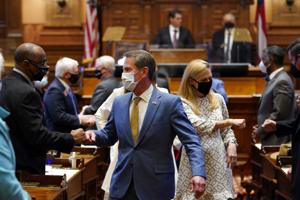Kemp says he wants to restore education spending in State of the State address

(The Center Square) – Gov. Brian Kemp touted Georgia’s resiliency and ability to weather the economic downfall from the COVID-19 pandemic during his State of the State address Thursday, as he proposed restoring some spending for the rest of the fiscal year and in fiscal year 2022.
Kemp signed the state’s $26 billion budget for fiscal year 2021 last summer. It contained $2.2 billion in cuts in response to projected revenue shortfalls, partially brought on by COVID-19 shutdowns.
“Despite incredible loss and unprecedented challenges, Georgia is still standing,” Kemp said. “Our house, built on a sure foundation, survived the storm. This state, while battered, is not broken. A better, brighter future is right around the corner.”
Kemp’s proposal for fiscal year 2022 reflects a recovered spending balance of $27.2 billion. There’s no need for the budget cuts or furloughs of the past, Kemp said Thursday, and taxpayers would not see tax increases.
Although Georgia’s coffers see signs of recovery, Kemp said it faces uncertainty in global and national markets. Still, the governor’s spending plan calls for fully funding K-12 schools, restoring higher education cuts and investments in rural development.
Kemp instructed budget writers to add $647 million to the amended budget for fiscal year 2021 and $573 million for fiscal 2022. The allocations fund enrollment growth at current levels over the two fiscal years. Schools also are expected to receive $3.5 billion through the federal Education Stabilization Fund. He also proposed fully funding enrollment for Georgia’s university system, which has seen enrollment rates drop because of the pandemic.
“I believe it’s the responsibility of all of those serving under this golden dome to send a clear message that we support our educators, students and parents,” Kemp said.
Kemp, who has been advocating for teacher pay raises for the past two years, said the state would use federal Coronavirus Aid, Relief and Economic Security (CARES) Act funding to provide educators with $1,000 bonuses. He plans to set aside $10 million in emergency education relief funds to reimburse parents and guardians for remote learning.
Senate Democratic Leader Gloria Butler, however, said the state must address the rising costs of higher education, especially in promoting economic growth.
Kemp’s other budget priorities include investments in transportation and rural communities that he believes will foster more economic growth.
The governor’s budget proposal includes $38.8 million for the State Road and Tollway Authority, which will help the authority obtain more than $500 million in Guaranteed Revenue Bonds to expand the state’s toll system. He also is pushing for $110 million in general obligation bonds to repair and replace the state’s bridges and upgrade the short-line rail system.
Kemp’s budget provides nearly $40 million for the Rural Innovation Fund to address economic obstacles in the state’s rural areas, which tend to be more financially fragile than metropolitan Georgia. His budget includes $20 million in the remainder of fiscal year 2021 and an additional $10 million in fiscal year 2022 for a broadband infrastructure grant program to improve rural internet access.
Kemp’s plan also sets aside $76 million to roll out the state’s partial Medicaid expansion and reinsurance programs, called Georgia Pathways and Access. Democrats who have continuously rallied for a full expansion decried the plan Thursday.
“It’s not what he talked about it. It’s what he didn’t talk about,” House Minority Leader James Beverly, D-Macon, said Thursday during a news briefing. “Expand the Affordable Care Act. It’s simple.”
Butler, D-Stone Mountain, said a full Medicaid expansion would help rural hospitals, which has been called “ground zero” for closures.
“Medicaid expansion is the path forward for Georgia,” Butler said. “Half a million Georgians would gain coverage, reducing the number of uninsured by half, and billions of our tax dollars would return to Georgia, saving lives, keeping rural hospitals open and reducing costs shifting to those not on Medicaid.”
Two budgets are passed through the General Assembly every legislative session. Lawmakers must review and approve spending for the remainder of the current fiscal year, also known as the Amended Fiscal Year budget, and approve the budget for the next fiscal year, which begins on July 1.
Appropriation committees must consider Kemp’s recommendation’s in the budget-drafting process. Once the House and Senate committees agree on a proposal, it must be approved by a floor vote in each chamber. The spending plan then would be sent to Kemp for final approval.
Disclaimer: This content is distributed by The Center Square

